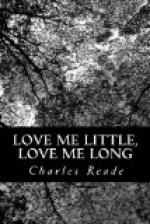“Yes, indeed, uncle;” and by a gymnastic of courtesy she first crushed and then so molded a yawn that it glided into society a smile.
“We have spent a delightful evening, Lucy.”
“Thanks to you, uncle.”
“I hope you will sleep well, child.”
“I am sure I shall, dear,” said she, sweetly and inadvertently.
CHAPTER II.
A large aspiration is a rarity; but who has not some small ambition, none the less keen for being narrow—keener, perhaps? Mrs. Bazalgette burned to be great by dress; Mr. Fountain, member of a sex with higher aims, aspired to be great in the county.
Unluckily, his main property was in the funds. He had acres in ——shire; but so few that, some years ago, its lord lieutenant declined to make him an injustice of the peace. That functionary died, and on his death the mortified aspirant bought a coppice, christened it Springwood, and under cover of this fringe to his three meadows, applied to the new lord lieutenant as M’Duff approached M’Beth. The new man made him a magistrate; so now he aspired to be a deputy lieutenant, and attended all the boards of magistrates, and turnpike trusts, etc., and brought up votes and beer-barrels at each election, and, in, short, played all the cards in his pack, Lucy included, to earn that distinction.
We may as well confess that there lurked in him a half-unconscious hope that some day or other, in some strange collision or combination of parties, a man profound in county business, zealous in county interests, personally obnoxious to nobody, might drop into the seat of county member; and, if this should be, would not he have the sense to hold his tongue upon the noisy questions that waste Parliament’s time, and the nation’s; but, on the first of those periodical attacks to which the wretched landowner is subject, wouldn’t he speak, and show the difference between a mere member of the Commons and a member for the county?
If anyone had asked this man plump which is the most important, England or ——shire, he would have certainly told you England; but our opinions are not the notions we repeat, and can defend by reasons or even by facts: our opinions are the notions we feel and act on.
Could you have looked inside Mr. Fountain’s head, you would have seen ideas corresponding to the following diagrams:
[drawing]
Mr. Fountain courted the stomach of the county.
Without this, he knew, an angel could not reach its heart; and here one of his eccentricities broke out. He drew a line, in his dictatorial way, between dinner and feeding parties. “A dinner party is two rubbers. Four gentlemen and four ladies sit round a circular table; then each can hear what anyone says, and need not twist the neck at every word. Foraging parties are from fourteen to thirty, set up and down a plank, each separated from those he could talk to as effectually as if the ocean rolled between, and bawling into one person’s ear amid the din of knives, forks, and multitude. I go to those long strings of noisy duets because I must, but I give society at home.”




